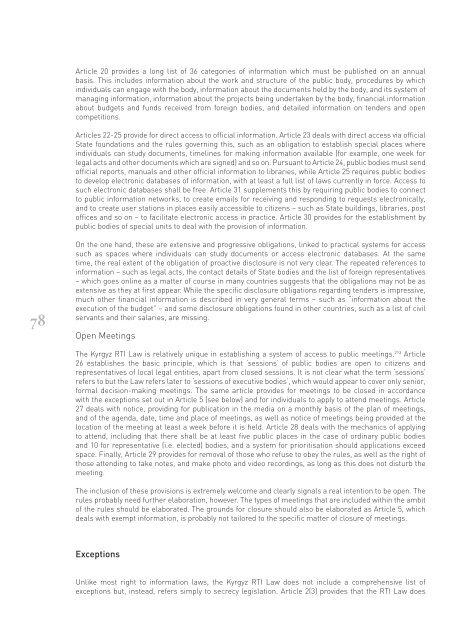Freedom of Information: A Comparative Legal Survey - Federation of ...
Freedom of Information: A Comparative Legal Survey - Federation of ...
Freedom of Information: A Comparative Legal Survey - Federation of ...
Create successful ePaper yourself
Turn your PDF publications into a flip-book with our unique Google optimized e-Paper software.
78<br />
Article 20 provides a long list <strong>of</strong> 36 categories <strong>of</strong> information which must be published on an annual<br />
basis. This includes information about the work and structure <strong>of</strong> the public body, procedures by which<br />
individuals can engage with the body, information about the documents held by the body, and its system <strong>of</strong><br />
managing information, information about the projects being undertaken by the body, fi nancial information<br />
about budgets and funds received from foreign bodies, and detailed information on tenders and open<br />
competitions.<br />
Articles 22-25 provide for direct access to <strong>of</strong>fi cial information. Article 23 deals with direct access via <strong>of</strong>fi cial<br />
State foundations and the rules governing this, such as an obligation to establish special places where<br />
individuals can study documents, timelines for making information available (for example, one week for<br />
legal acts and other documents which are signed) and so on. Pursuant to Article 24, public bodies must send<br />
<strong>of</strong>fi cial reports, manuals and other <strong>of</strong>fi cial information to libraries, while Article 25 requires public bodies<br />
to develop electronic databases <strong>of</strong> information, with at least a full list <strong>of</strong> laws currently in force. Access to<br />
such electronic databases shall be free. Article 31 supplements this by requiring public bodies to connect<br />
to public information networks, to create emails for receiving and responding to requests electronically,<br />
and to create user stations in places easily accessible to citizens – such as State buildings, libraries, post<br />
<strong>of</strong>fi ces and so on – to facilitate electronic access in practice. Article 30 provides for the establishment by<br />
public bodies <strong>of</strong> special units to deal with the provision <strong>of</strong> information.<br />
On the one hand, these are extensive and progressive obligations, linked to practical systems for access<br />
such as spaces where individuals can study documents or access electronic databases. At the same<br />
time, the real extent <strong>of</strong> the obligation <strong>of</strong> proactive disclosure is not very clear. The repeated references to<br />
information – such as legal acts, the contact details <strong>of</strong> State bodies and the list <strong>of</strong> foreign representatives<br />
– which goes online as a matter <strong>of</strong> course in many countries suggests that the obligations may not be as<br />
extensive as they at fi rst appear. While the specifi c disclosure obligations regarding tenders is impressive,<br />
much other fi nancial information is described in very general terms – such as “information about the<br />
execution <strong>of</strong> the budget” – and some disclosure obligations found in other countries, such as a list <strong>of</strong> civil<br />
servants and their salaries, are missing.<br />
Open Meetings<br />
The Kyrgyz RTI Law is relatively unique in establishing a system <strong>of</strong> access to public meetings. 213 Article<br />
26 establishes the basic principle, which is that ‘sessions’ <strong>of</strong> public bodies are open to citizens and<br />
representatives <strong>of</strong> local legal entities, apart from closed sessions. It is not clear what the term ‘sessions’<br />
refers to but the Law refers later to ‘sessions <strong>of</strong> executive bodies’, which would appear to cover only senior,<br />
formal decision-making meetings. The same article provides for meetings to be closed in accordance<br />
with the exceptions set out in Article 5 (see below) and for individuals to apply to attend meetings. Article<br />
27 deals with notice, providing for publication in the media on a monthly basis <strong>of</strong> the plan <strong>of</strong> meetings,<br />
and <strong>of</strong> the agenda, date, time and place <strong>of</strong> meetings, as well as notice <strong>of</strong> meetings being provided at the<br />
location <strong>of</strong> the meeting at least a week before it is held. Article 28 deals with the mechanics <strong>of</strong> applying<br />
to attend, including that there shall be at least fi ve public places in the case <strong>of</strong> ordinary public bodies<br />
and 10 for representative (i.e. elected) bodies, and a system for prioritisation should applications exceed<br />
space. Finally, Article 29 provides for removal <strong>of</strong> those who refuse to obey the rules, as well as the right <strong>of</strong><br />
those attending to take notes, and make photo and video recordings, as long as this does not disturb the<br />
meeting.<br />
The inclusion <strong>of</strong> these provisions is extremely welcome and clearly signals a real intention to be open. The<br />
rules probably need further elaboration, however. The types <strong>of</strong> meetings that are included within the ambit<br />
<strong>of</strong> the rules should be elaborated. The grounds for closure should also be elaborated as Article 5, which<br />
deals with exempt information, is probably not tailored to the specifi c matter <strong>of</strong> closure <strong>of</strong> meetings.<br />
Exceptions<br />
Unlike most right to information laws, the Kyrgyz RTI Law does not include a comprehensive list <strong>of</strong><br />
exceptions but, instead, refers simply to secrecy legislation. Article 2(3) provides that the RTI Law does
















